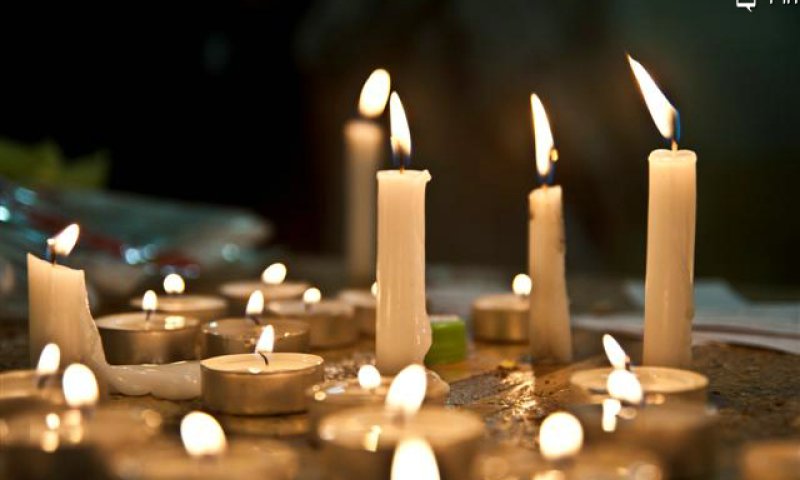
Military Rabbi who freed Buchenwald camp - died
In New York, at the age of 95, Rabbi Hershel Schechter z"l who served as rabbi of the Sixth Armored Division, passed away • He was the man who found Hgry"m Lau behind a pile of bodies
- Shlomo Greenberg and Moshe Weisberg, Behadrey Haredim
- י"ג ניסן התשע"ג

מנחם הלוי
Baruch Dayan Ha'emes: In New York died yesterday at the age of 95, Rabbi Hershel Schechter z"l, former Hapoel Hamizrahi Council President, and head of the rabbinical services at Yeshiva University in New York. In his youth he was a military and religious officer in the U.S. Army during the Second World War, and one of the 311 chaplains who served in the U.S. Army during the war.
The deceased was the one who found the boy now known to us all as Hagaon Rabbi Israel Meir Lau, Chief Rabbi of Tel Aviv, at the Buchenwald concentration camp, when American soldiers released it after the war.
It was on April 11, 1945 when in the morning most of the SS left the camp. The underground took over the camp, and were able to capture several dozen SS men. That day American soldiers arrived at the camp, the Sixth Armored Division, including Rabbi Schechter, Rabbi of the division.
The group remained until after Shavuos. Rabbi Schechter was responsible for the issue of religion in the camp, and was also the one who organized the Shavuos prayer at Buchenwald concentration camp after its liberation, when it became a DP camp, before evacuating the area.
The deceased z"l was also a member of the administrative at the OU organization responsible for the Jewish communities relations of the organization.
One of his sons is Rabbi Yaakov Schechter, a researcher and lecturer at Yeshiva University, who said: "Our father took care of many Jews and promoted the Torah world. He devoted his life to the Jewish people."
His funeral will be held today (Friday) at 10:00am New York time.
May his soul be cherished in the bundle of life.
Rabbi Lau: I saw tears in his eyes
In his book "From the Depths", Rabbi Lau tells of the moments when Rabbi Schechter came into the camp, and the exciting encounter between them:
"I was terrified of the new army which came through the camp gates. We did not know if it was for us - or against us. I hid behind a pile of corpses. Rabbi Hershel Schechter, the military Rabbi of the division and later president of the Conference of Presidents of the United States, told many times about the meeting between us.
"He went down from one of the jeeps in military uniform and stood in front of a pile of bodies. Suddenly he thought he saw a pair of eyes, open and alive. Panic gripped him. Maybe he even pulled out a gun with the instinct of a soldier to defend himself. Then, which I remember vividly, he encountered me - a child of eight - watching him behind the hill of bodies, with eyes wide open. The amazement showed on his face: in the carnage, in a pool of spilled blood, suddenly a boy! I was stone petrified, while he - it was clear to him that a child in this place, means a child Jewish.
"The Rabbi put the gun back. He grabbed me with both hands, hugged me with a fatherly hug and lifted me up on his hands on. Then asked with a heavy accented Yiddish: "Vi alt bistu, mein kind?" (How old are you my child). I saw tears streaming from his eyes. Despite this I was overwhelmed with fear and my response was cautious, as someone who kept himself to himself: What does it matter? Anyway, I'm older than you "...
He smiled through his tears and asked, "Why do you think you're older than me?" Without hesitation I replied, "Because you cry and laugh like a child, and it's been a long time since I laughed and even to cry - I do not cry. Then who of us is older?"
Later, Rabbi Lau tells, Rabbi Schechter asked for his family name and origin, and was excited when he heard that he was the son of the Rav of Pietrikov and cousin of the Gaon Rabbi Meir Shapiro of Lublin zt"l. When Rabbi Lau told him that he was living alone without a father and mother in the camp only with his brother Naphtali, who was lying sick in the camp due to typhus, the two walked together to search the hospital at Buchenwald. On their way, they went together to bring the news of liberation to the barracks.
"I remember there were people lying there, with dark eyes, they did not have enough power to get themselves up from their own bunks, to run to the gate of the camp and shout 'hurray' along with everyone else. "Jews you're free," the American Rabbi shouted in Yiddish. People endowed him with a puzzled look, which asked without sound "Who is this meshugana standing there in uniform and shouting in Yiddish"...
Once in the hospital, Rabbi Schechter introduced himself to Naftali, as rabbi of the military division that liberated the Buchenwald camp. He took out some cans of orange juice. "I know who you are, I'll help you and everything will be fine," he said to Naftali the patient and finished the sentence: "Congratulations, we went from slavery to freedom."
"Naphtali would say that Rabbi Hershel Schechter was the first person who gave him relief and gave him the confidence in himself and human beings," writes Rabbi Lau.
תגובות
{{ comment.number }}.
הגב לתגובה זו
{{ comment.date_parsed }}
{{ comment.num_likes }}
{{ comment.num_dislikes }}
{{ reply.date_parsed }}
{{ reply.num_likes }}
{{ reply.num_dislikes }}



הוספת תגובה
לכתבה זו טרם התפרסמו תגובות